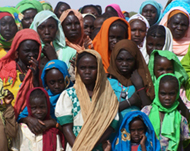UN to continue Darfur monitoring
The UN Security Council has allowed UN experts, who have recommended sanctions on top Sudanese officials, to continue monitoring atrocities and arms embargo violations in Darfur.

The list of candidates for sanctions, which was not released, was given to Security Council members in a report earlier this month.
The report said that all sides in Darfur had violated an arms embargo, with the government supplying weapons to brutal militia groups and rebels escalating fighting.
But Nassir Abdulaziz al-Nasser, Qatar’s UN ambassador, told the Security Council that the experts’ accusations included “people of the highest authority,” indicating President Omar Hassan al-Bashir might be on the list.
Qatar, a firm ally of the Khartoum government, castigated the experts for not being objective on Darfur.
Al-Nasser questioned the use of imposing sanctions on government officials at a time when the UN is negotiating with them over the expansion of an African Union (AU) force trying to stem continued violence in Darfur.
However, on Friday the council voted 15-0 to keep the experts on the job for another year, until September 29, 2007, while adding a fifth member to the previously four-member panel.
Barroso visit
Also on Friday, the European Commission said that Jose Manuel Barroso, the EU president, would go to Sudan shortly to try to persuade Khartoum to allow UN peacekeepers into the region.
The Sudanese government had earlier rejected a call from the US secretary of state to accept the peacekeepers, as the head of the UN in the country admitted any deployment was unlikely in the near future.
Khartoum said Condoleezza Rice’s demand that Sudan must choose between co-operation and confrontation on a UN force was an attempt to put pressure on the government.
Rice called for an immediate ceasefire and threatened sanctions against any rebel group which continued to refuse to sign a peace deal that was agreed in May.
The Darfur peace agreement was violated more than 70 times between May and August, and in September Khartoum carried out a large-scale offensive in northern Darfur, according to UN officials.
On Thursday, tensions between the government and the only rebel group which signed the deal degenerated into an open shootout in Omdurman.
Leaders of the Sudan Liberation Army Movement (SLAM) Minai Arkoi faction said they had taken three police officers hostage in retaliation to the arrest of three of their members.
Sudanese opposition
In other news, Jan Pronk, the head of the UN in Sudan, has said that the international community should work on keeping the existing AU mission in the region indefinitely as UN forces are unlikely to be deployed because of Sudanese opposition.
“I don’t expect the government to accept a UN transition any time soon,” Pronk said.
A Security Council resolution agreed to send 17,000 troops and 3,000 police to replace the ill-equipped and underfunded AU force that has failed to prevent escalating violence in Darfur.
 |
|
Fighting in Darfur displaced has |
But the force cannot legally be deployed without the Sudanese president’s consent.
Pronk called for the AU force’s mission to be reinforced and extended indefinitely to safeguard humanitarian work in Darfur, where more than 200,000 people have been killed and 2.5 million displaced during three years of fighting.
“Our first priority must be to help the people of Darfur,” he said.
Pronk said he was confident the Sudanese government would allow the African troops to stay in Darfur, although Khartoum only has agreed to their deployment for another three months.
African mission
The 7,000-strong AU force was due to leave Darfur at the end of September, but recently prolonged its mission until the end of the year. John Bolton, the US ambassador to the UN, called it a temporary measure while pressure is brought on Sudan to accept the peacekeepers.
In a related development, Mark Malloch Brown, the deputy secretary-general of the UN, has criticised “megaphone diplomacy” by the US and Britain in trying to persuade Sudan to accept the UN force.
“Sudan doesn’t see a united international community,” Malloch Brown said. “And that allows it to characterise themselves as the victims of the next crusade after Iraq and Afghanistan.”
He called for other countries, such as China, to be involved in pressuring Sudan, as well as incentives, sanctions and a diplomatic coalition to support them.
Earlier this week, Sudan’s top official for Darfur said the government was willing to let some UN military advisers join the AU forces, describing it as “a third way” that could resolve the stand-off between Khartoum and the UN.